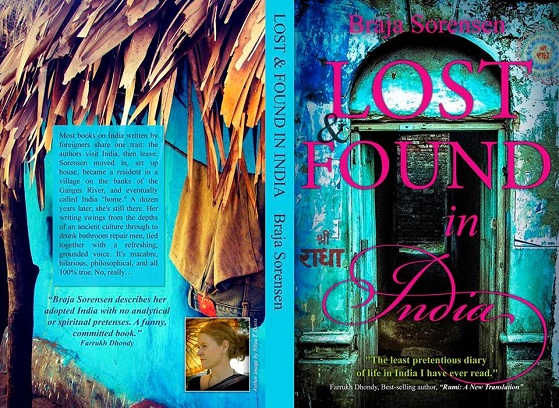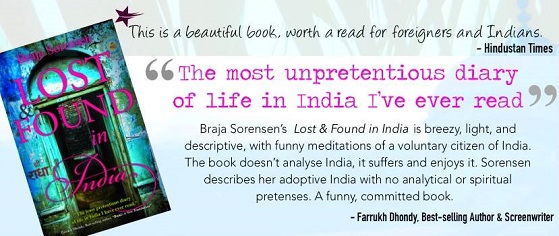15 Years In India, 15 Reasons To Stay… Or Run.
To celebrate the international release of the paperback version of Lost & Found in India, this article includes a giveaway for Rebelle readers. The catch is, you have to read to the end. I know: it’s India, there’s always someone trying to pull one over on you… what to do?
India is a nation of dichotomies and controversies, ludicrous claims and harsh realities, bold-faced lying politicians and genuine holy-men — or is that bold-faced lying holy-men and genuine politicians? Its jaw-dropping landscapes and breathtaking architectural art forms lay deep and long in my veins, they are part of my being and nature and history and life and future and breath and love and heart and mind and soul…
But it burns. Oh, does it burn: the savagery, hypocrisy, brutal ignorance and harsh idiocy; the poverty and pain and heartbreaking daily agony that is seen by all and touched by none who can fix with one sprinkle of their inordinately unfair wealth and influence. An Indian’s ability to care appears to hover around zero; an Indian’s ability to care stuns me and is there when I need it, when I expect it the least.
So let’s go, a quick 15, but before we start… well, no: let’s make it the first one:
1. I am not a travel writer, and never have been. When I arrived in India in the early 90s, I don’t think there was anyone but William Dalrymple and Mark Tully writing books about the real Indian experience. People travelled to India, but it wasn’t a trend — it just was. We were here, and that was it. The proliferation of websites and FB pages and people who write about travelling in India is wonderful. It’s a massive place with an even more massive and complex truth to it: you’ll find your own. Just don’t believe everything you read.
2. One of the first chapters in Lost & Found in India is entitled Don’t Ask Why. Because the words have no impact in India. Learning not to ask Why opens the universal doors of truth and knowledge, welcomes you into a realm of possibility that doesn’t exist while answers are demanded by minds forced to function by the rules of material delineation. There are no answers that you will understand, and since you can’t change it, there’s no point asking.
3. You can’t change it. See? Whether or not you are a believer in the varying levels of energy that exist in the world, one truth is as clear as day: the material energy functions in a totally different manner in India than it does anywhere else in the world. Let it go, roll with it, and learn a new way of not being who you were… you might even like what you find.
4. Don’t bring yourself to India, find yourself here. Too many times I’ve seen those who come here and intend, plan, determine, or vow. It’s a waste of time (see #2). Let your Indian self be found here, and let your western self highlight it: don’t try and westernize everything. Just flow.
5. When in Rome… it works its way into the blood (or is already there) and makes living in India more simple. Again, see #2, and just do it: life is easier when you’re one of them.
6. I’ll never be one of them. Despite the fact that this is my home, that this is a place I’ve lived in longer than anywhere else in the world, despite that I have no other home, still I am asked every time I’m out in public, which country are you from, and myriad other questions that plonk me squarely back in the tourist box. I live in no woman’s land: neither here nor there. I have no claim to this land, nor my own, I am lost between borders, and hereby claim the cause of my ongoing and increasing psychologically questionable condition.
7. Sounds. Without a doubt, sound defines all the reasons I continue to live in and love India. From boats crossing the river at the end of our track, to bus horns, train horns, the call of the chai wallah — I even love the sound of the insanity of Calcutta (possibly because I only visit there). But it is the somehow indolent yet reliable dong, dong of the bell at the gate of our nearby temple that is my guiding sound as it announces the time all through the day and night. 24 hours a day, the temple guards rise on the hour and perform their duty. Sometimes raucous and sharp tolls on a loud and colorful festival day; sometimes solemn and slow, in the small hours of a misty, dark, and long night: a solo dongggg that resounds across the village, and is the beat of my heart.
8. Food. It’s a vegetarian’s dream come true — street food and train food is vegetarian, vegetable produce is prolific, cooks are a dime a dozen, and restaurants and eateries everywhere. I love Indian food, all of it, and all you need to know is to ask for no chillies. You’ll be fine. No, really.
9. Hospitals. Where’s your sense of humor? Don’t believe everything you hear about Indian hospitals. Go and see it, then you’ll believe it, and then go to a real one. My husband and I spent weeks in one after a head-on collision with a truck. We loved it there. No, really. I know a good plastic surgeon if you need one.
10. When we were little, didn’t we dream of life being an adventure? Something new and exciting and different every day? Outrageous plots, unbelievable storylines, colourful characters, and magic endings? Welcome to India.
11. I hate this place. (I did mention dichotomies, didn’t I?). I can’t list the things I hate — I could never write an article that long. Trust me, it’s long. But why bother? It just is.
12. I love this place (dichotomies). Nor could I list all the things I love about it, either, as it would be equally long. I wouldn’t live anywhere else in the world. But I do return to the beaches of Australia from time to time, seeking my sanity in the squillionty-nine grains of sand that have blown across it since I dropped it there.
13. Truth. Everything you see and hear and feel in India is the truth. Nothing is sugarcoated, cleaned up, swept under the rug, or hidden. Death, disease, poverty, wealth, happiness, celebration — the works. All of it is on display. Not hidden in embarrassment. Just there. Because it is.
14. Mr. Modi. Sorry, we love Mr. Modi. There. I said it.
15. My cat, my cow, and the occasional semi-titled goat in Delhi who lives in Mehrauli and roams the grounds of a famed writer and his beautiful artist wife and talks with other neighborhood animals about what’s wrong with all these ridiculous humans. And he’s possibly right. Well done, Gilbert.
And now, if you’ve made it all the way to the end of this, go and get your free e-copy of Lost & Found in India, for Rebelle readers only, and while you’re there, buy 10 copies and give one to everyone for Christmas… thank you, and good night. Or Inshallah. Or Hare Krishna, Namaste, Om, Shalom, and all that…


